Rural police station extends helping hand to nature
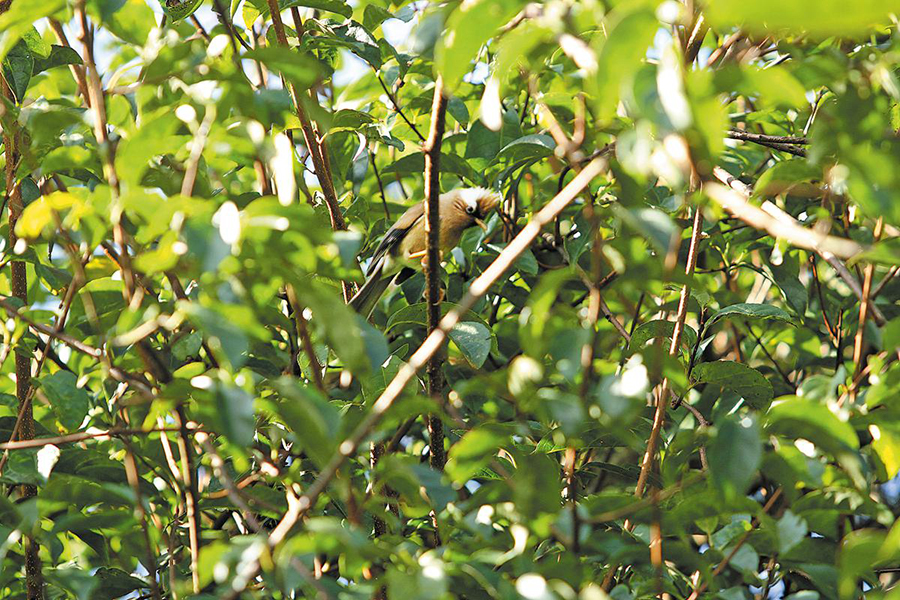
Wildlife on Dazhong Mountain, which forms part of the Ailao Mountains National Nature Reserve, is protected by officers at Hongtupo Forest Police Station in Chuxiong Yi autonomous prefecture, Yunnan province. HOU WEIJING/FOR CHINA DAILY
Illegal hunting of birds targeted, migratory species protected
In the past four decades, Dazhong Mountain in Yunnan province has stood silent witness to ways in which public awareness on environmental protection has changed significantly, with humans and wildlife benefiting from green efforts.
From September to February each year, the mountain, situated in Nanhua county, Chuxiong Yi autonomous prefecture, is home to more than 50 million migratory birds from some 430 species.
Local villagers, who have been lifted out of poverty, used to visit the mountain to catch birds to eat or sell. The residents nicknamed the mountain "Da Que Shan", which translates as "bird-hunting mountain". But one year, chirping birds were no longer heard on its slopes.
Tao Faqing, 61, who lives in Zhongshan village in Nanhua, said: "When I was young, every year the birds passed through Da Que Shan, and people in the village would hunt them. Gradually, these avian visitors fell silent."
Environmental damage in the area also posed a threat to other creatures and plants on the mountain, which covers 17,100 hectares, is rich in biodiversity and forms part of the Ailao Mountains National Nature Reserve.
"When the mountain became barren and the birds stopped chirping, people began to worry if migrant species would ever return to the area," Tao said.
"We used to hunt birds, just as people visiting the coast go digging for clams, and those in the mountains go mushroom-picking. At the time, no one realized that hunting birds was wrong. If we didn't hunt them, what would we serve our guests during Spring Festival?"
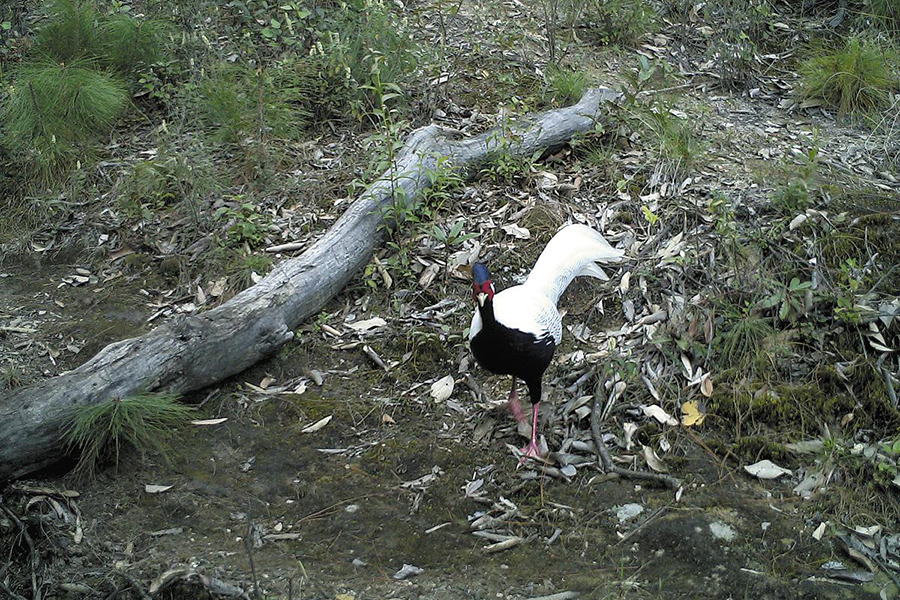
Wildlife on Dazhong Mountain, which forms part of the Ailao Mountains National Nature Reserve, is protected by officers at Hongtupo Forest Police Station in Chuxiong Yi autonomous prefecture, Yunnan province. HOU WEIJING/FOR CHINA DAILY
In 1984, the Hongtupo Forest Police Station was established to crack down on illegal hunting and protect migratory birds. Officers at the station worked on the mountain from September to February, tracking the paths of migratory birds.
Initially, police patrolled the mountain without any major life necessities. There were no communication signals, and officers slept in tents despite the cold and the threat from wild animals, until a small shelter was built at the foot of the mountain in 2010.
Police officer Liu Yan said: "The toughest time was winter, when my quilt was never dry. When I was on duty, I walked long distances and sometimes found myself separated from my colleagues. I was all alone in the vast mountains. Words can't describe how I felt on such occasions."
Yang Zhengqiang, another police officer, said the forest terrain is steep, and poachers sometimes hide in the area.
"At night, when we are looking for poachers, we don't make a sound or use our flashlights. We once saw a campfire in the distance, but while crossing a ravine, I slipped and fell. My colleagues didn't notice, and I was afraid the accident would affect the operation, so I didn't dare make any noise. When dawn broke, I realized a high cliff was just a little further ahead of me."
Li Qiangao, former head of the police station, said: "In addition to mosquitoes and leeches, we needed to look out for wild boars, bears and venomous snakes. We often rolled around on the ground while capturing poachers, and when we stood up, we were covered in blood, as there were also many thorny plants in the forest."
He added that the police sometimes fell into ditches or became lost when they chased the poachers. Li once walked for two hours along a stream until finding a way off the mountain when the sun rose.
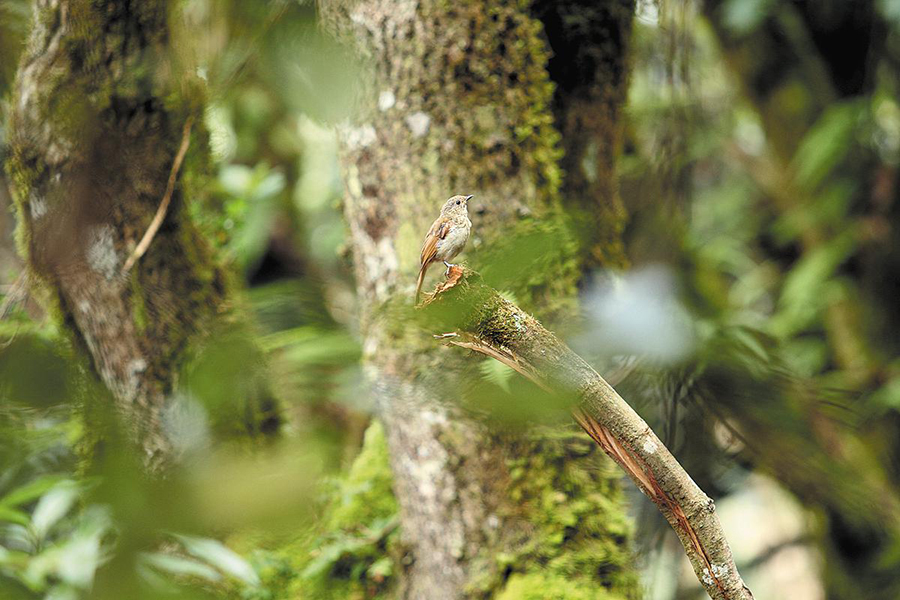
Wildlife on Dazhong Mountain, which forms part of the Ailao Mountains National Nature Reserve, is protected by officers at Hongtupo Forest Police Station in Chuxiong Yi autonomous prefecture, Yunnan province. HOU WEIJING/FOR CHINA DAILY
The duration, personnel and routes of the patrols are generally not fixed. The walking distance ranges from 5 to 50 kilometers. During patrols, the officers carry essential equipment such as tents, sleeping bags, ropes, water, medicine and food — usually rice and dry rations. Each patrol group consists of two to 10 people, Li said.
In heavy fog, officers on patrol teams connect themselves with a rope to prevent falling or getting lost. In extreme weather conditions, when they lose their way or are attacked by animals, they leave their remaining supplies of food and water with younger officers to seek help.
"It is a tradition to leave the last drop of water for such officers so that our mission of protecting migrant birds is passed down from generation to generation," Li said.
Since 2009, a total of 1,516 administrative forestry cases have been investigated and handled, with 1,589 individuals penalized. More than 376 illegal hunting tools have been confiscated, along with 264 firearms and more than 2,300 rounds of ammunition.
Door-to-door visits
As well as targeting criminal offenses, officers at the police station, together with the local government, work to improve awareness among villagers of the need to protect birds and other forms of wildlife.
Police carry out door-to-door visits among villagers to promote such work, but at first, the villagers didn't listen. Li said, "Before we entered their homes, I heard them muttering: 'Here come those people again'."
He added that officers first chat with the villagers, and help them with farm work. After this, the main focus is on promoting laws and regulations related to wildlife protection, along with the legal responsibilities associated with hunting and eating wild animals.
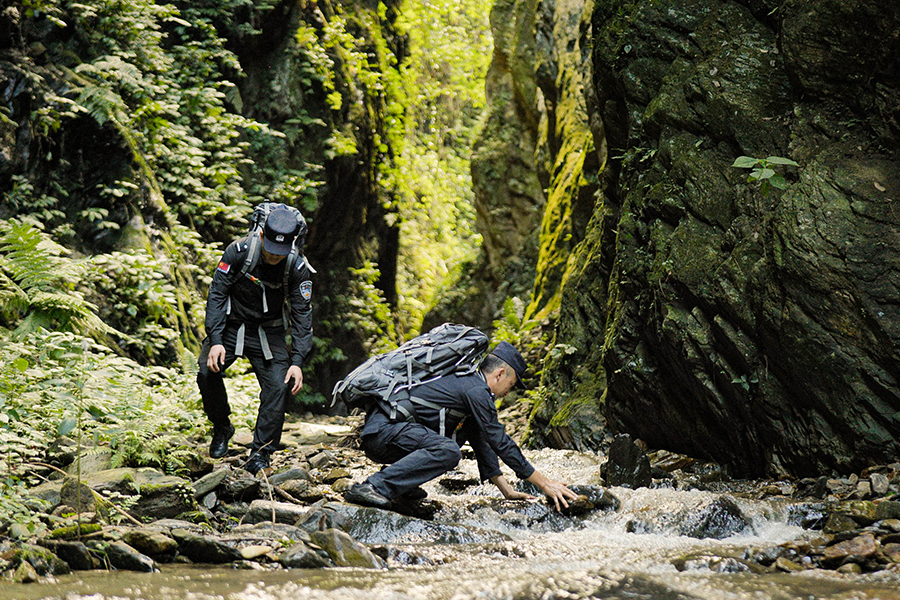
Officers fetch water from a stream during a patrol on Dazhong Mountain. HOU WEIJING/FOR CHINA DAILY
To change the villagers' views, police also organized promotional activities in schools to get their message across to children.
Li said, "From resistance to acceptance, and then to support, each stage has taken a long time, ranging from several years to more than a decade, or even several decades."
Forty years ago, when he was a child, Li lived in a village in the area. One day, he saw adults lighting a bonfire and walking into the mountains with bamboo poles. Migratory birds flew toward the fire, falling victim one by one to the poles. The villagers collected the birds and took them home to eat.
"The cries of the birds echoed around the mountains, and also triggered my desire to protect them," Li said. After asking his father how he could help save migratory birds, his father told Li he could do so by becoming a police officer.
In 1999, Li graduated from a police training school, and for 18 years worked as chief of Hongtupo Forest Police Station, performing his duty of protecting the birds.
"Years ago, people thought birds were there to be hunted and eaten. Now, even children know that birds are to be observed and loved. The 'bird-hunting mountain' has become the 'bird-protecting' mountain," Li said.
Years of hard work have paid off. Since 2019, there have been no reports of wild birds being hunted on Dazhong Mountain. The police station now operates mainly to promote avian protection and wild animal rescue work.
Modern technological aids such as video surveillance, infrared cameras and drones are used to monitor poachers, fires and the behavior of wild animals.
If migratory birds encounter strong sources of light from cities or villages along their flight paths, they are easily misled and deviate from their intended route.
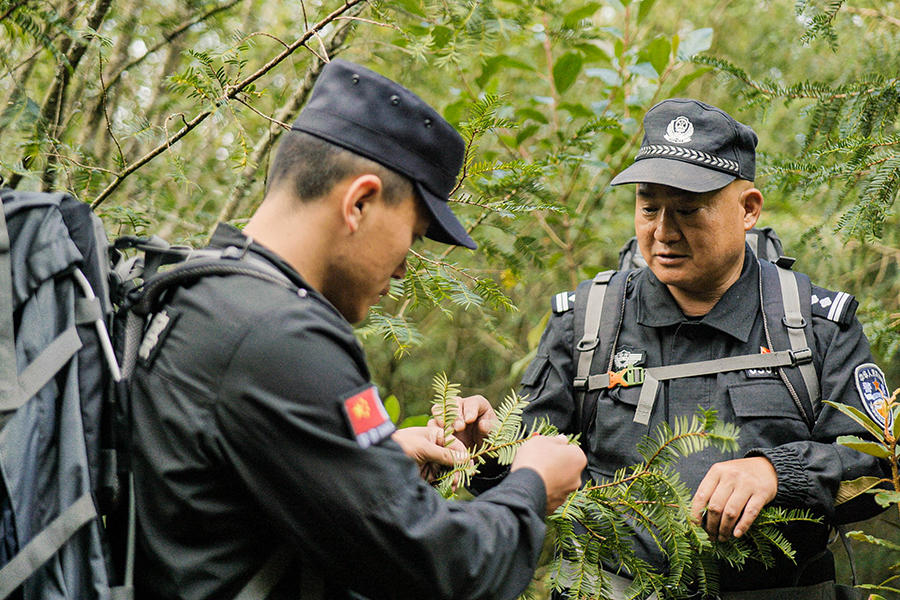
Plants are inspected by officers in a Chinese yew forest on the mountain. HOU WEIJING/FOR CHINA DAILY
To ensure the birds arrive at their destinations, officers from the police station close the searchlight on the observation tower and tell villagers living at the foot of the mountain to stop using spotlights.
Over the past 20 years, locals have become used to turning off lights at night for three months of the year to help the birds.
Li said, "If the villagers' crops are damaged by wild animals, they report such incidents to the police, but they no longer harm the animals. They also rescue wildlife that is injured."
Animal kingdom
Birds of many colors now fly over the villagers' heads, either in straight lines or zigzags, on the mountain, which boasts lush vegetation and many species of wildlife not seen in the area before.
Zhang Yueping, director of Hongtupo Forest Police Station, which is staffed by seven officers, including one woman, said: "The mountain is greener, the water is clearer, and the variety and quantity of wildlife and plants are constantly increasing. Wild animals, including forest musk deer and black-necked long-tailed pheasants, have reappeared in the area."
In addition to cracking down on illegal activity such as hunting and selling wild animals and their products, Zhang said the station will work to eradicate the habit of eating wild animals.
Observation stations have also been set up to monitor the habitats and populations of wild animals. These stations enable visitors to experience avian activities at all times and sense the harmonious coexistence between humans and animals.

A ceremony is held to mark the arrival of a new chief at the police station and the retirement of its predecessor. HOU WEIJING/FOR CHINA DAILY
Zhang said that together with other government departments, the police station plans to help build the Ailao Mountains National Forest Park, "to make wild animals a shared resource for people around the world".
The police station has become a mini zoo for rescued animals. More than 1,000 wild birds and other creatures, including black gibbons, bears, macaques and pythons, are released from the station every year. Many of them are rescued by locals.
A resident once brought a barn owl caught in a glue trap to the station. Officers removed the adhesive from the owl's feathers with scissors, washed it thoroughly, and placed it in a police car to bask in the midday sun.
By the time the officers had finished lunch, the owl had flown off. However, it later returned with several others, and they made their home in trees that stand near the police station. The officers even prepared food for the owls.
Xiao Jiu, a macaque whose legs were injured, was found by villagers, who took it to the police station, where officers bathed the animal and played with it every day. However, it later damaged taps and notebooks at the station, and as the creature was too young to survive in the wild, the police sent it to a zoo.
Good returns
Local residents are also benefiting from green changes.
Jiang Wenkui, 41, who has been a forest ranger for 16 years, said, "Forest vegetation has increased significantly, and we no longer have any landslides in the area."
Villager and forest ranger Tao Faqing said, "There are more birds and fewer insects, which is good news for our crops."
Tao Faqing, who patrols the mountain and reports any suspicious activities, said: "Birds are humans' best friends. We are responsible for protecting them."

The mountain is patrolled by officers. HOU WEIJING/FOR CHINA DAILY
Some 200 forest rangers from Majie town work at observation stations in the area, where many villagers have opened bed-and-breakfast establishments to accommodate bird watchers and photographers.
Tao Jingping, 42, who runs a homestay with three rooms and offers catering services in Zhongshan village, Majie, said a maximum of 70 tourists arrive each day.
"As the environment has improved significantly, I wanted to start my own business at home," she said, adding that the homestay earns her more than 10,000 yuan ($1,396) a year.
"The village has changed a lot, and nobody hunts birds anymore. When they were still young, my daughter and son told me how cute birds are and that we need to protect them," she said.
Liao Chengfang, town mayor of Majie, said it plans to develop industries such as Chinese herbal medicine and ecotourism to increase residents' income.
"We are also considering a plan to offer high-end healthcare and rehabilitation programs to attract retirees to the area during the summer vacation, where they can rent a small courtyard to cook their own meals," he said.
"We will provide them with organic ingredients, and they can also go foraging for mushrooms in the mountains in July and August."
Photos
Related Stories
- Researchers bid to unlock mystery of shrinking mountain peaks
- Sunrise scenery on Gangshika snow peak in Qinghai
- Crystal ice drifts in Heihe River
- Fish-like patterns emerge in desert's sunlight
- Discover undeniable charms of Hongcun Village in Anhui Province
- Migratory birds flock to national reserve
- Fairyland scenery at Majiagou valley in Sichuan
- Golden oasis of desert poplar forests along Tarim River in Xinjiang
- Tekesi River: Xinjiang's autumn romance
- Autumn scenery in Dangling village, SW China's Sichuan
Copyright © 2023 People's Daily Online. All Rights Reserved.









